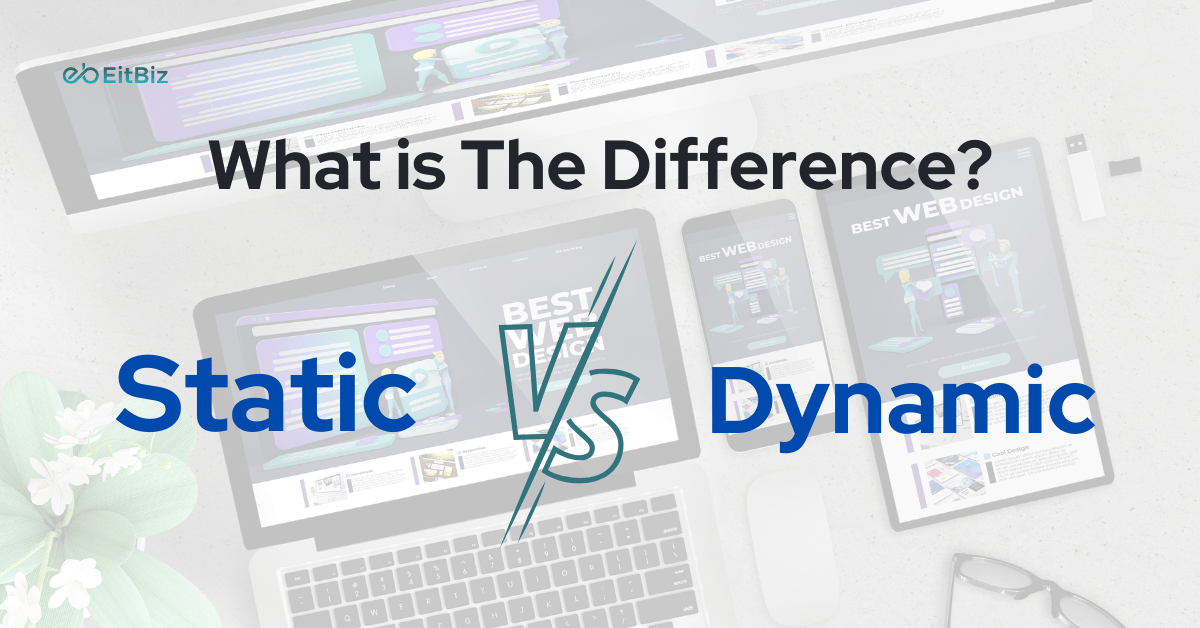If you are planning to get your website designed and developed by hiring a team of web designers & developers, this blog will surely help you. In this blog, we have discussed two very important types of websites, static websites and dynamic websites. After reading this blog, you will know the difference between static and dynamic websites.
What is a Static Website?
A static website is a website that is composed of HTML, CSS, and JavaScript files that are stored on a web server and served to the user’s web browser as-is. In other words, a static website is a website that does not use server-side scripting or a database to generate its content dynamically.
The content of a static website remains the same until the website owner manually updates it. These types of websites are easy to create and require minimal server-side resources, making them a popular choice for small businesses or personal websites that don’t require frequent updates. However, they lack interactivity and advanced functionality that is possible with dynamic websites.
What is a Dynamic Website?
A dynamic website is a website that generates content on the fly, in response to user requests or other inputs. Unlike a static website, which displays the same content to every visitor, a dynamic website can personalize the content for each visitor based on their preferences, history, or other factors.
Dynamic websites use server-side scripting languages like PHP, Ruby, Python, or JavaScript, along with a database to generate and serve content. The server-side code retrieves data from the database, processes it, and generates HTML pages that are sent to the user’s web browser.
Dynamic Vs Static: Advantages
Now that you must have an understanding of what static and dynamic websites are, let’s get to their advantages so you can decide which one to choose to get your website designed.
Advantages of Static Website
Simplicity: Static websites are easy to create and maintain since they are composed of simple HTML files that do not require any server-side scripting or database connectivity.
Speed: Since there is no processing required on the server-side, static websites can load quickly, providing a faster user experience.
Security: Static websites are less vulnerable to security threats since they do not have any server-side scripting, making them less susceptible to attacks like SQL injection or cross-site scripting.
Cost-effective: Static websites require minimal resources and do not require ongoing maintenance, making them a cost-effective solution for small businesses or personal websites.
Reliable: Static websites can be hosted on any web server and can be served even during high traffic periods, ensuring maximum uptime and reliability.
SEO friendly: Static websites are easily crawled and indexed by search engines, making it easier to optimize for search engine rankings.
Overall, static websites are a simple and reliable solution for businesses or individuals who need a basic online presence, but do not require advanced functionality or frequent updates.
Advantages of Dynamic Website
Personalization: Dynamic websites can tailor the content to the individual user, providing a personalized experience that can improve engagement and conversions.
Interactivity: Dynamic websites can include advanced functionality like user registration and login, e-commerce, social networking features, and more, making them more interactive and engaging for users.
Scalability: Dynamic websites can handle large amounts of data and traffic, making them suitable for large-scale web applications that require scalability.
Search engine optimization: Dynamic websites can be optimized for search engines, allowing them to rank higher in search results and drive more traffic to the site.
Content management: Dynamic websites can be easily updated and managed using content management systems (CMS), allowing non-technical users to add, edit, or delete content without requiring technical expertise.
Data analysis: Dynamic websites can track user behavior and generate analytics reports, providing insights that can be used to optimize the website and improve the user experience.
Overall, dynamic websites offer greater flexibility and interactivity than static websites, making them a suitable solution for businesses or individuals who require advanced functionality or frequent updates. However, they require more resources and technical expertise to create and maintain, and may be more vulnerable to security threats than static websites.
Static or Dynamic: Which is Better?
In Terms of Content
Static websites have fixed content that does not change unless manually updated, while dynamic websites can generate content on the fly based on user inputs, database queries, or other factors.
Which Offers More Functionality
Static websites are limited in terms of functionality, while dynamic websites can include advanced functionality like e-commerce, user authentication, content management, social networking, and more.
Which is Faster
Static websites are faster to load since they do not require server-side processing, while dynamic websites can be slower due to the processing time required to generate content.
In Terms of Scalability
Static websites are generally not scalable, while dynamic websites can handle large amounts of data and traffic, making them suitable for large-scale applications.
Which is More Secure
Static websites are generally more secure since they do not require server-side scripting, while dynamic websites may be more vulnerable to security threats like SQL injection or cross-site scripting.
Cost Difference
Static websites are generally less expensive to create and maintain since they require fewer resources and expertise, while dynamic websites can be more expensive due to the need for server-side scripting, database connectivity, and ongoing maintenance.
Overall, the choice between a static or dynamic website depends on the specific needs and goals of the website. Static websites are suitable for simple websites with fixed content, while dynamic websites are more appropriate for complex websites that require advanced functionality and personalized content. In our opinion, if you are looking to get an intuitive and engaging website built, go for dynamic website development. If you haven’t found a team of website developers yet, reach out to our team of website development experts to know how our expertise can benefit your business.
Author
-

Sandy K is the dynamic and visionary Director at EitBiz. With a rich tapestry of experience spanning almost 15 years, Sandy has cultivated a unique, global perspective that he brings to the forefront of EitBiz’s operations. Visit Linkedin
View all posts




